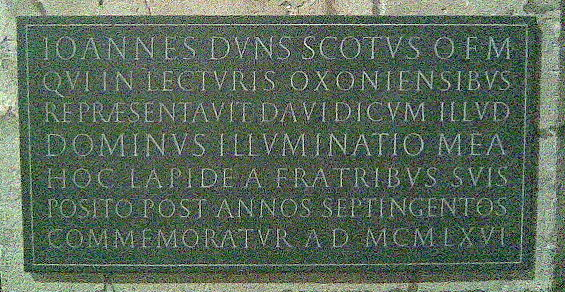The following is a plaque in commemoration of the 700th anniversary of the birth of John Duns Scotus:
(Source of image here)
In text (missing some details like interpuncts and ligatures):
IOANNES DVNS SCOTVS OFM
QVI IN LECTVRIS OXONIENSIBVS
REPRAESENTATVIT DAVIDICUM ILLVD
DOMINVS ILLVMINATIO MEA
HOC LAPIDE A FRATRIBVS SVIS
POSITO POST ANNOS SEPTINGENTOS
COMMEMORATUR A D MCMLXVI
My attempt to translate it:
John Duns Scotus O.F.M [Fransican friar], whom in lecturing oxonians represented David [that?] // The Lord is my light // this tombstone [?] from his brothers [fransiscan friars] placed in commemoration of 700 years // year of the Lord 1966
That just does not sound right. Not sure how to put David in there. Lapide is almost literal in Spanish (lapida) but not sure what is best for English. And the last bit is also strange. Not sure how to fit commemoratur as it does not state in commemoration of what. But, of course, many other things could be wrong!
